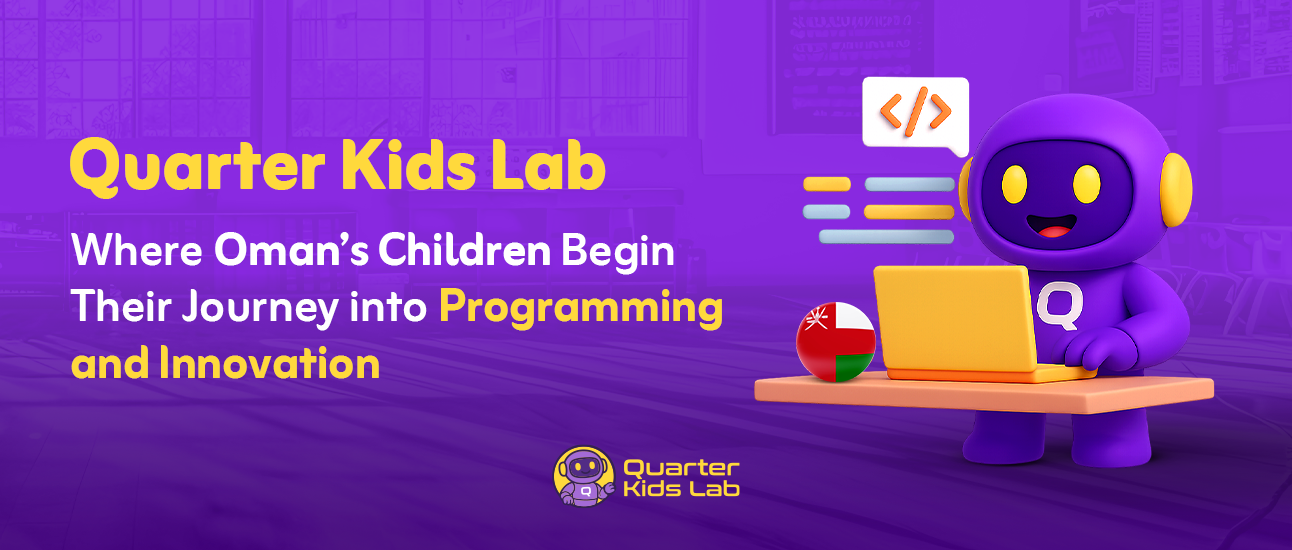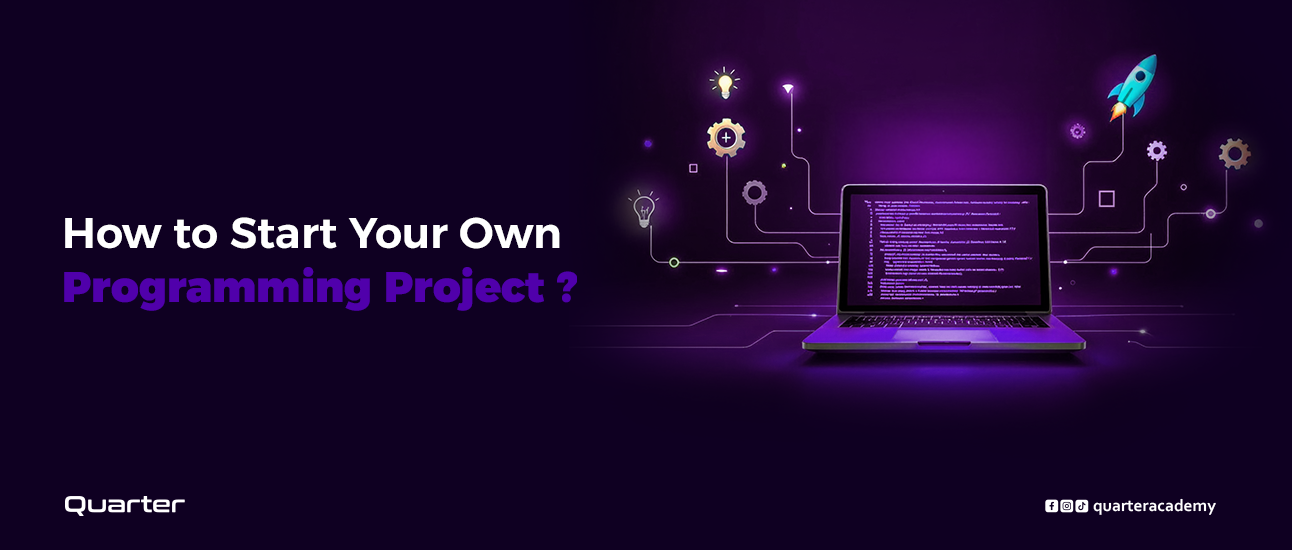Quarter Kids Lab – The Beginning of a Journey of Creativity and Coding for Omani Children

In today’s world, technology has become an inseparable part of our daily lives, and every day we hear about innovative ideas and new tech projects. As a parent, you surely want to see your son or daughter not just using devices, but creating programs, games, and applications with their own hands. This is where Quarter Kids Lab comes in — the place where children in Oman begin their journey into the world of programming and innovation.
Fun Learning from Day One
At Quarter Kids Lab, we don’t offer boring lessons, nor do we have children memorize code they don’t understand. Every lesson is an educational adventure where we combine play with hands-on experience, so the child enjoys and learns at the same time.
Why is Quarter Kids Lab the Best Choice for Oman?
- World-Class Curricula Designed for Children: We follow the STEM methodology, which combines science, technology, engineering, and mathematics.
- Real-Life Projects: Children get to see their work turn into a game or app they can proudly showcase to family and friends.
- Skilled Instructors: With expertise in programming and working with children in ways that motivate them and keep them excited to learn.
Your Child’s Journey Step-by-Step
- We conduct a level assessment interview to know exactly where to start.
- We guide them through levels suited to their age and skills, from basics to advanced.
- At each level, they work on a practical project applying what they’ve learned.
- We provide clear progress reports to parents.
From Play to Creativity
Our goal is to turn playtime into an opportunity for creativity, and imagination into innovation. Children in Oman can be more than just technology users — they can be creators.
Register your son or daughter today at Quarter Kids Lab, and let them start their journey in the world of programming and innovation with confidence and enthusiasm.
Tags
related articles
view all
How to Know if You Are Ready to Enter the World of Programming in Saudi Arabia
If you're a university student in Saudi Arabia aspiring to enter the world of professional programming, Quarter Academy offers a range of exceptional courses designed specifically to prepare you for the job market.
Quarter Academy’s courses are built on a practical, comprehensive curriculum that covers both fundamental and advanced skills, making them the perfect choice to kickstart your programming journey.
Top Programming Courses at Quarter Academy
1. Back-End Development Course
- Course Description:
- This course is ideal for anyone looking to learn back-end programming using Python and the Django framework.
- What You’ll Learn:
- Create databases using SQL and integrate them into applications.
- Develop APIs to connect front-end and back-end systems.
- Enhance application security and deploy them on cloud servers.
- Why Choose It?
- The course focuses on practical projects, enabling you to build dynamic, real-world applications.
2. iOS App Development Course
- Course Description:
- Learn how to design and develop iOS mobile applications using Swift and Xcode tools.
- What You’ll Learn:
- Build high-quality applications and publish them on the Apple App Store.
- Design exceptional user interfaces and professional user experiences.
- Understand how to use databases within applications.
- Why Choose It?
- With the growing popularity of Apple devices in Saudi Arabia, this course is a golden opportunity to enter the iOS app development field.
3. Web Development Course
- Course Description:
- A comprehensive course that covers the basics of designing and developing websites using HTML, CSS, and JavaScript, with a focus on creating dynamic and responsive websites.
- What You’ll Learn:
- Build professional, fast-performing websites.
- Use frameworks like Angular, React.js, and Node.js to develop modern websites.
- Improve user experience through interactive design.
- Why Choose It?
- This course aligns with the rapid growth of e-commerce and the increasing demand for web developers.
Why Choose Quarter Academy’s Courses?
1. Practical and Comprehensive Curriculum
Quarter’s courses emphasize applying theoretical concepts through real-world projects, helping you effectively develop your skills.
2. Professional Instructors
Learn from industry experts with extensive hands-on experience who provide ongoing support to students throughout the learning process.
3. Certified Programs
Upon completing the course, you’ll receive an accredited certificate that enhances your employability with top companies.
4. Flexible Learning Options
The courses are available online, allowing you to study anytime and anywhere without the need for full-time commitment.
5. Career Support
Quarter Academy offers guidance on building your resume and preparing for job interviews, helping you kickstart your career with confidence.
What Students Say About Quarter Academy
"The course was comprehensive and helped me understand the basics of programming practically. Now, I’m working on my first real-world project."
— Ahmed, Back-End Development Student
"I learned so much in the iOS course, and the instructors were very supportive. I was able to build and publish an app successfully!"
— Noura, iOS Development Student
"The data analysis course opened new doors for me in my career. Now, I understand how to use data to support business decisions."
— Salem, Data Analysis Student
Start Your Programming Journey Now with Quarter Academy!
Don’t miss the chance to learn programming from the best experts in Saudi Arabia. Choose the course that aligns with your ambitions and start your journey toward a future full of opportunities.
Sign up now through Quarter Academy’s website and take advantage of exclusive offers!

Quarter: The Gateway for Egyptian Programmers to Go Global
Embark on a future full of opportunities with Quarter, Egypt's leading destination for programming education. With advanced curricula, hands-on training, and strong partnerships with leading tech companies such as Alalmyia Alhura IT, Quarter equips you with the skills needed to join the ranks of elite programmers worldwide. Seize the opportunity now and turn your ambitions into reality with Quarter – your gateway to global success!
What is Quarter?
Quarter is a leading Egyptian programming school specializing in teaching programming and technical skills to Egyptian and Arab youth and children. The academy aims to empower students and recent graduates to discover their passion for programming and offer high-quality educational opportunities that meet the needs of the evolving job market. Quarter focuses on providing distinguished scientific content and preparing a new generation of exceptional programmers with creative problem-solving skills. The academy offers an interactive learning environment, combining academic expertise with practical application, helping students acquire the skills needed to succeed in programming, artificial intelligence, and application development. It includes a variety of courses such as web design, project management, mobile app development, cybersecurity, and more, through 12 training tracks. With an ambitious vision, Quarter seeks to be the leading programming school in Egypt, focusing on innovation and collaboration with leading companies, to be the gateway for Egyptian programmers to the global stage.
How Quarter Leads You to Become a Professional Programmer
-
Comprehensive Educational Programs: Quarter offers a variety of integrated educational programs and courses covering all aspects of programming, enabling students to build a strong foundation in the field. The courses include business analysis, application development, and cybersecurity.
-
Hands-On Interaction and Real-World Experience: Quarter provides students with the opportunity to work on real projects and apply what they have learned in a practical environment, enhancing their understanding and increasing their confidence as programmers.
-
Guidance and Mentoring from Experts: Students benefit from continuous guidance from professional trainers with extensive experience in their fields, helping them direct their career paths and develop their skills effectively.
-
Opportunities for Collaboration with Companies: Quarter strives to collaborate with leading technology companies, offering students opportunities for internships and employment after graduation, and helping them enter the job market directly.
-
Development of Critical Thinking Skills: By focusing on problem-solving, the academy enhances students' critical thinking skills, enabling them to develop new solutions and tackle technical challenges efficiently.
-
Supportive Community: Quarter provides a supportive community of students and alumni, allowing for knowledge and experience exchange, and fostering collaboration and creativity.
What Makes Quarter the Top Choice for Programmers in Egypt?
-
Quality of Education: Quarter stands out for offering high-quality educational programs with modern and advanced curricula designed to meet the changing needs of the job market.
-
Trained Experts: Quarter has a team of exceptional trainers and experts in programming and technology fields, ensuring the delivery of reliable and effective educational content.
-
Focus on Practical Skills: Quarter emphasizes practical learning through real projects and applications, helping students acquire the necessary skills directly.
-
Continuous Support: Quarter provides ongoing support to students through advisory sessions and personalized mentoring, helping them achieve their educational and professional goals.
-
Partnerships with Companies: Quarter builds partnerships with leading technology companies, offering students real professional training opportunities and employment prospects after graduation.
-
Interactive Learning Environment: The academy offers an interactive learning environment that encourages discussion and collaboration among students, enhancing their educational experience.
-
Updated Content: Quarter regularly updates its content to meet the changing needs of the market, ensuring that students learn the latest trends and technologies.
-
Diverse Programs: Quarter provides a variety of programs and courses, allowing students to choose the path that best fits their interests and goals.
-
Forward-Looking Vision: Quarter aims to be a leader in programming education in Egypt, with an ambitious vision to foster innovation and collaboration in the technology fields.
How Quarter is Revolutionizing Programming Education for Egyptian Youth
Quarter has revolutionized programming education in Egypt through several key factors:
-
Innovative Educational Methodology: Quarter relies on an educational methodology that focuses on practical application and real projects, making learning more enjoyable and effective. Rather than abstract theories, students find themselves building web applications and real systems, deepening their understanding of programming concepts.
-
Strategic Partnerships: Quarter has formed partnerships with major technology companies such as Alalmyia Alhura IT, providing students with opportunities for practical training and working on real projects within these companies. This approach brings them closer to the real work environment and offers invaluable hands-on experience.
-
Focus on Practical Skills: Quarter goes beyond teaching basics to emphasize the development of practical skills needed by programmers in the job market. Students are trained on the latest tools and software, enabling them to compete effectively upon graduation.
-
Building a Learning Community: Quarter encourages the creation of a learning community through forums and groups that bring together students, teachers, and industry experts. This community offers students the chance to connect and exchange knowledge and experiences, enhancing the learning process.
-
Marketing and Awareness: Quarter aims to raise awareness about the importance of programming and its role in societal development. The academy uses various marketing channels to attract youth and encourage them to join.
-
Continuous Development: Quarter is committed to ongoing development and innovation. The academy listens to student feedback and continuously improves its programs to meet the evolving needs of the job market.
Join us now and secure your place in the future, Quarter …… A step to the future.

How to Start Your Own Software Project?
Thinking of starting your own software project? You're on the right track to enter a world filled with creativity and opportunities. Software projects have become one of the most lucrative and innovative fields, but they require meticulous planning and efficient management. In this article, we’ll guide you step-by-step on how to start your own software project professionally and successfully.
1. Define Your Software Project Idea
1.1 Solve a Real Problem
The best projects solve a genuine problem for customers. Look for gaps in the market or specific needs your software can address. Ask yourself: What problem can I solve?
1.2 Innovation Creates Distinction
Don’t just solve the problem—offer an innovative solution. Make your idea stand out by providing a superior user experience or unique features that add value to your customers.
2. Conduct a Comprehensive Feasibility Study
2.1 Market Analysis
Analyze your target market before starting. Who are your potential customers? What are their needs? Use tools like Google Trends to understand market trends and evaluate competition.
2.2 Estimate Costs and Revenues
Prepare a financial plan that includes expected costs and projected revenues. This helps determine the required investment size and ensures project sustainability.
3. Create a Detailed Business Plan
3.1 Set Goals
Define both short-term and long-term goals. For instance, "Develop an initial version of the app within six months" or "Achieve 500 active users in the first year."
3.2 Develop a Clear Roadmap
Create a timeline that outlines the key milestones for development and launch. Ensure your plan is flexible to accommodate any changes that might arise.
4. Build the Right Team
4.1 Identify Required Skills
Determine the skills needed to execute the project, such as programming, design, and marketing expertise.
4.2 Hire or Partner
Work with a cohesive team of experts or partner with experienced developers. You can also use freelance platforms like Upwork and Freelancer to find the right talent.
5. Develop a Minimum Viable Product (MVP)
5.1 What is an MVP?
An MVP is a simplified version of your project that includes only the core features. It allows you to test your idea with minimal costs.
5.2 How to Develop an MVP?
- Select the most critical features.
- Start by building a simple yet functional version.
- Gather customer feedback to refine the product.
6. Choose the Right Technology
6.1 Programming Languages
Choose the most suitable programming language based on your project’s nature, such as Python for AI applications or Flutter for mobile apps.
6.2 Tools and Platforms
Use tools like GitHub for code management and Slack for team communication.
7. Marketing Strategy for Your Software Project
7.1 Build a Brand
Design a logo and a visual identity for your project that reflects your vision and objectives.
7.2 Digital Marketing
- Create a professional website showcasing your services.
- Use Google Ads and social media platforms to reach your target audience effectively.
8. Launching Your Software Project
8.1 Launch Planning
Set a launch date and promote it beforehand to generate interest from potential customers.
8.2 Managing Challenges
Be prepared to address technical issues or customer inquiries. Quick responses enhance your project’s reputation.
9. Continuous Improvement and Development
9.1 Listen to Your Customers
Collect feedback from users and work on improving the product based on their needs.
9.2 Regular Updates
Release periodic updates to add new features and improve performance.
10. Tips to Ensure the Success of Your Software Project
- Start with a clear and specific plan.
- Invest in building a strong team.
- Be flexible and ready to adapt to changes.
Conclusion
Starting a software project isn’t just about having an idea—it’s a journey that requires vision, planning, and meticulous execution. By following the steps outlined above, you’ll be equipped to build your project confidently and achieve the success you’re aiming for.
FAQs
1. What are the essential skills needed to start a software project?
Key skills include programming, project management, and marketing.
2. How can I ensure the success of my software idea?
Conduct thorough market research and develop an MVP to gather customer feedback.
3. Do I need prior programming experience to start a project?
Basic programming knowledge is helpful, but you can partner with professional developers if needed.
4. What are the best tools for developing a software project?
Common tools include GitHub for code management and Trello for task organization.
5. How long does it take to develop a software project?
The timeline depends on the project’s size and complexity but typically ranges between 6 months and 1 year.
Start your journey now, and remember, success begins with a single step!
Courses
Subscribe
make the right move for your future.
Powered By
© 2026 Quarter. All Rights Reserved